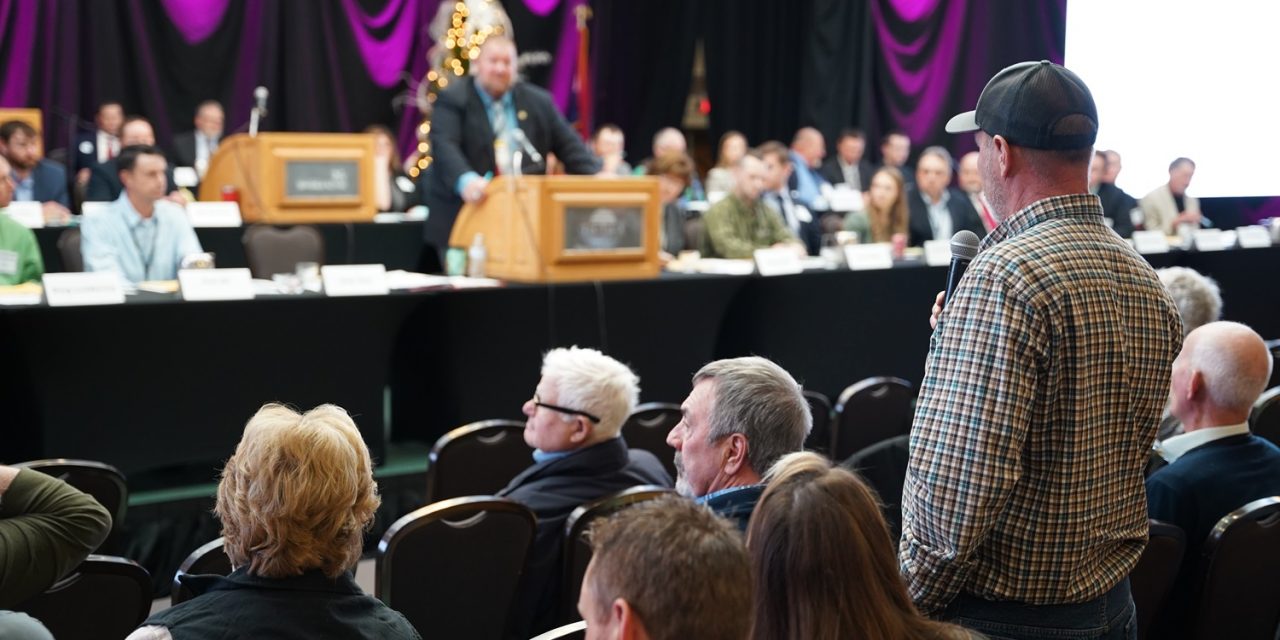We’ve closed the books on the 109th Missouri Farm Bureau annual meeting. As MOFB President, there’s nothing more invigorating than coming together with members to reconnect and set policy for the new year. Looking back on the growing season and the legislative session, we saw some significant highs and lows. In spite of what has been a challenging year, bringing together more than one thousand Missouri farmers and ranchers who are passionate about the future of agriculture and rural America, is inspiring.
This year’s theme, “Guided by Tradition,” drives home the heart of MOFB. We are, and always have been, a grassroots organization. There is no better place to witness that in action than the floor of the delegate session during the annual meeting. That’s where members, representing every county in the state, review, discuss and vote on policies that will lead the organization through the next twelve months.
Among the legislative accomplishments in 2023 was Missouri Governor Mike Parson’s signing of legislation to expand I-70 to six lanes from St. Louis to Kansas City. Our members want to build on that progress by improving hard infrastructure across the state. They prioritized rural roads and the expansion of I-44 and funding to complete the future I-57 project. They also call for any expansion of I-44 or I-57 to take place in the median to lessen the impact on private property.
MOFB members are anxious for Congress to pass a new five-year farm bill. As work continues in Washington, D.C., delegates support increasing reference prices for Title 1 commodities and strengthening the Pasture Rangeland and Forage Program to provide better protection for livestock producers who rely on forage production.
As the federal government continues to spend hundreds of billions of taxpayer dollars on green policy projects, our members want to see a more balanced approach to the nation’s energy policy. Delegates reiterated their support for alternative energy sources, but oppose federal subsidies that skew the marketplace in favor of industrial-scale wind and solar projects. The group adopted policy language to address their concern over the rapid retirement of traditional energy sources, namely coal and natural gas. They note the ongoing, aggressive push to eliminate these time-tested energy sources will greatly decrease the reliability of the electric grid, and cost consumers more to keep the lights on.
This year, Missouri and other states also saw the closure of large meat processing plants. When these big processors leave a rural community, it puts many people out of work. When they simply lock the doors and walk away, they also shut out the potential for another business to continue operations. Drastic job losses ripple throughout the region, eroding other local industry, schools and healthcare facilities. That’s why MOFB members set up a policy urging large agribusinesses to attempt to sell their assets to lessen the impact on farm families and local communities, rather than closing down without giving another business the opportunity to continue operations.
Delegates continue to support the prohibition of foreign ownership of agricultural land, but oppose efforts to require divestiture of currently held assets. They also support an exemption for agricultural research efforts.
MOFB members support the use of proven, safe technology in production agriculture. They strengthened language supporting the use of livestock vaccines that have undergone sound scientific, peer reviewed research. They oppose efforts to restrict access to any state or federally approved livestock vaccine technology.
Federal policy recommendations from our annual meeting will be submitted for consideration at the American Farm Bureau annual meeting next month in Salt Lake City, Utah. In Utah, Farm Bureau members from across the country will review policy recommendations submitted by all states, and collectively lock in the organization’s policy priorities for 2024.
MOFB friends, this is your organization’s grassroots work in action.


